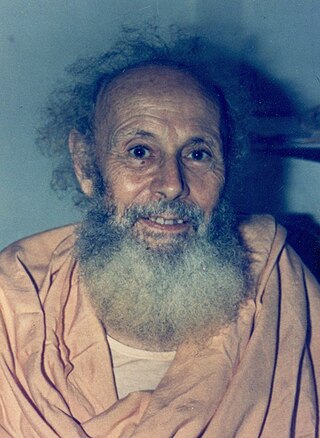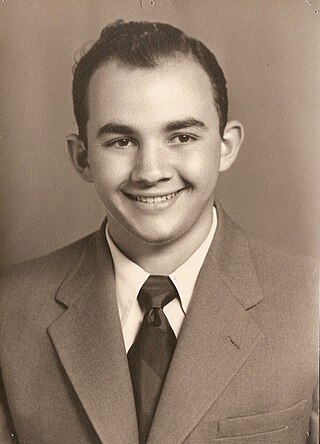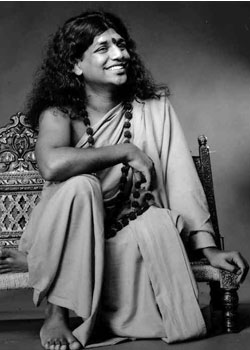
Swami Muktananda Paramahamsa, born Krishna Rai, was a yoga guru and the founder of Siddha Yoga. He was a disciple of Bhagavan Nityananda. He wrote books on the subjects of Kundalini Shakti, Vedanta, and Kashmir Shaivism, including a spiritual autobiography entitled The Play of Consciousness. In honorific style, he is often referred to as Swami Muktananda, or Baba Muktananda, or in a familiar way just Baba.

Siddha Yoga is a spiritual path founded by Swami Muktananda (1908–1982). According to its literature, the Siddha Yoga tradition is "based mainly on eastern philosophies" and "draws many of its teachings from the Indian yogic texts of Vedanta and Kashmir Shaivism, the Bhagavad Gita and the poet-saints." The present head of Siddha Yoga is Gurumayi Chidvilasananda.

Nityananda, also called Nitai, was a primary religious figure within the Gaudiya Vaishnava tradition of Bengal. Nitai was Chaitanya Mahaprabhu's friend and disciple. They are often mentioned together as Gaura-Nitai or Nimai-Nitai. Followers often refer to Nityānanda as "Sri Nityananda", "Prabhu Nityananda" or "Nityananda Rama".

Kriyananda was an American Hindu religious leader, yoga guru, meditation teacher, musician, and author. He was a direct disciple of Paramahansa Yogananda and founder of the spiritual movement named "Ananda". He wrote numerous songs and dozens of books. According to the LA Times, the main themes of his work were compassion and humility, but he was a controversial figure. Kriyananda and Ananda were sued for copyright issues, sexual-harassment, and later, for alleged fraud and labor-law violations.
Gurudeva is a generic address to a guru in Hinduism.
Gurumayi Chidvilasananda, born Malti Shetty on 24 June 1955, is the guru or spiritual head of the Siddha Yoga path, with ashrams in India at Ganeshpuri and the Western world, with the headquarters of the SYDA foundation in Fallsburg, New York.

Bhagawan Nityananda was an Indian guru. His teachings are published in the "Chidakash Gita". Nityananda was born in Koyilandy (Pandalayini), Madras Presidency, British India.
Nityanand Swami may refer to:

Nityanand Swami was the chief minister of the Indian state of Uttarakhand, named Uttaranchal during his administration. He was the first chief minister of the state, serving from 9 November 2000 to 29 October 2001.

Abhishiktananda, born Henri Le Saux, was a French-born Indian monk. He moved to India in 1948 in search of a more radical form of spiritual life, adopted sannyasa in accordance with Indian tradition and became one of the pioneers of Hindu-Christian dialogue. Multiple contacts with prominent saints such as Sri Ramana Maharshi, Sri Gnanananda Giri and Sri H.W.L. Poonja, led him to profound advaitic experience as well as to final recognition of the truth of advaita during the last years of his life.

Shree Muktananda Ashram, in the Catskills area of upstate New York, is owned and operated by the SYDA Foundation. Its purpose is to provide a location where students of Siddha Yoga can study the philosophy and culture of the Siddha Yoga path and follow its daily practices. Shree Muktananda Ashram houses the headquarters of the SYDA Foundation, the organization that protects, preserves, and facilitates the dissemination of the Siddha Yoga teachings. The ashram is located in South Fallsburg, approximately 130 kilometres north-west of New York City.
Ram Dass (1931–2019) was a contemporary American spiritual teacher and former academic who wrote the 1971 bestseller Be Here Now.
Gurudev Siddha Peeth is an Indian ashram run by the Gurudev Siddha Peeth Trust and serving the Siddha Yoga path. It is situated between the villages of Ganeshpuri and Vajreshwari in the state of Maharashtra, 70 miles (110 km) north-east of Mumbai. On the Siddha Yoga path it is known as the "mother ashram" because it is where Siddha Yoga began.

Albert Rudolph, known as Rudi or Swami Rudrananda, was a spiritual teacher and an antiquities entrepreneur in New York City. He was born in Brooklyn, New York.

Nithyananda, known among followers as Nithyananda Paramashivam or Paramahamsa Nithyananda, is an Indian Hindu guru and often called a "godman". He is the founder of Nithyananda Dhyanapeetam, a trust that owns temples, gurukulas, and ashrams in many countries. A number of mainstream news outlets, inside and outside India, and a TV documentary series on Disney+ have referred to the organisation as a cult, its leader as a conman, and his micronation of Kailaasa a scam; his organization has denied any wrongdoing.

The Advaita Guru-Paramparā is the traditional lineage (parampara) of divine, Vedic and historical teachers of Advaita Vedanta. It begins with the Daiva-paramparā, the gods; followed by the Ṛṣi-paramparā, the Vedic seers; and then the Mānava-paramparā, with the historical teachers Gaudapada and Adi Shankara, and four of Shankara's pupils. Of the five contemporary acharyas, the heads of the five Advaita mathas, four acharyas trace their lineage to those four pupils and one to Adi Shankara himself.

Bijoy Krishna Goswami, also known by the honorific Gosaiji, was a Hindu social reformer and religious figure in India during the British period.
Prem Kumar is the name of:










